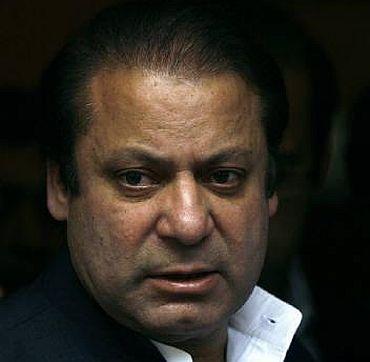 Noting that Pakistan's Prime Minister-elect Nawaz Sharif appears to be sincere in his effort to improve relationship with India, a former top American diplomat has said he might not be able to do much unless he brings on board the powerful military.
Noting that Pakistan's Prime Minister-elect Nawaz Sharif appears to be sincere in his effort to improve relationship with India, a former top American diplomat has said he might not be able to do much unless he brings on board the powerful military.
Responding to reporters' questions on the positive vibes coming from Lahore on improving India-Pak ties, the former US Ambassador to Pakistan Cameron Munter Wednesday said the key to it's the relationship Sharif develops with the military.
"I think many Indians, because of historical reasons, seem to have a suspicion of the Pakistani military.
"The Pakistan military, working with Nawaz, in a kind of positive way, could go a distance to alleviate those fears," Munter said in a conference call organised by Council on Foreign Relations, a Washington-based eminent American think-tank.
"But I think that unless they (Sharif and military) are able to come up with a comprehensive or a coherent approach to India that involves not only the power players among the civilians, but among the military, there may be limits to what they can do," Munter said.
Munter was stationed in Islamabad from October 2010 to July 2012; a period when the bilateral relationship between the two countries was hit several times by a number of incidents like Raymond Davis case, the killing of Osama bin Laden in his Abbotabbad safe house and the death of 26 Pak soldiers in a cross border fire by the US forces.
During his stay in Islamabad, he met Sharif brothers in Lahore multiple times.
"Every time I talked with Nawaz, and with Shahbaz his brother, there was a smart focus on the economic impact of the measures that are being discussed between these two countries to improve visa processes, to improve the ability to get goods across the border," Munter said.
"I think Nawaz (Sharif) has been a big supporter of that. I think one of the questions which is the relation that Nawaz needs to develop with military at this point, will be key here," Munter said.
Daniel Markey, Senior Fellow for India, Pakistan and South Asia, at the Council on Foreign Relations, observes that Nawaz Sharif and his ruling coalition and his party, in fact, are being pulled in two distinct directions.
"...they recognize that improved relations with India, stability with India, and even trade openings with India all serve those purposes. So that's sort of the positive face of the party and of Nawaz Sharif," Markey said.
But at the same time, Markey said Sharif has been associated with, affiliated with in some instances, more extreme organisations in Punjab.
“So the question is whether he will actually try to forthrightly tackle the problem of Jemaat-u-Dawa, Lashkar e-Tayiba, and whether he will pull away from the face of being kind of a hard-line nuclear hawk -- which, frankly, is what he was in the 1990s.
"How can he manage both of these things at once? It's going to be a very difficult balancing act for him," the American expert said.






 © 2025
© 2025